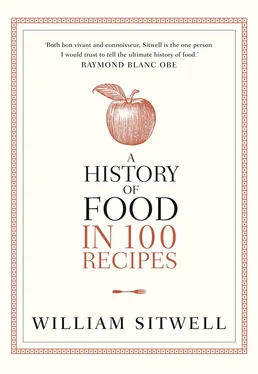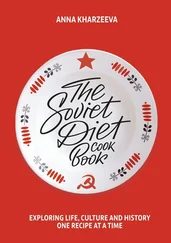
Alamy: Mary Evans Picture Library
Marcus Gavius Apicius.
Apicius’s book is Europe’s oldest and ancient Rome’s only surviving recipe book. As Joseph Vehling, who translated it into English in 1926, wrote: ‘The way to a man’s heart is through his stomach; so here’s hoping that we may find a better way of knowing old Rome and antique private life through the study of this cookery book.’ Yet it was never plain sailing. Apicius’s recipes may paint a picture of luxurious dinners, of exquisite flavours and textures, but he had to deal with a bureaucracy that must have infuriated him.
Today, chefs and restaurateurs have to be much more than providers of good food. Aside from creating a restaurant worth eating at, they have to deal with council officials, inspectors and regulators, not to mention listening to the advice of their PRs and tolerating the critics. Apicius had his problems too. History books may carry the legends of Roman decadence but at the time many looked down upon those who enjoyed extravagant lifestyles. Writers such as Pliny and Plutarch disapproved of high living in the form of fine dining, let alone feasting. And they weren’t alone – severe laws existed that fixed the amount a household could spend on specific types of food.
Senior politicians and officials felt a need to protect public morals. Not that it stretched to stopping people watching Christians being eaten by lions in the Coliseum. So imperial food inspectors were sent out to perform spot checks on kitchens, not dissimilar to how hygiene officials operate today. Fortunately there was another aspect of life that was rife back then: corruption. So one can imagine Apicius, on being told a posse of ingredient inspectors were on their way, dispatching one of his chefs to entertain the inspectors when they arrived. No doubt the food wardens would have been quickly seduced with promises of some tasty morsels for them to take home, a meal in the kitchen or very likely money, gold even. Because they clearly failed to stop the purchasing of expensive ingredients and the dinners for which they were intended.
Wealthy food-loving Romans thus easily brushed aside the food police and circumvented the law. Which meant they were able to indulge in Apicius’s delectable food and, of course, his sauces. And there are sauces to accompany every meat you can think of, from hare and duck to lobster and sardines. But not the oft-mentioned ‘dormouse’ – not so much a mouse as a large rodent that lived in trees (not unlike a squirrel). Apicius stuffed it with pork, nuts and herbs and then roasted or boiled it, but he can’t have been that keen on it as he doesn’t do a sauce to match. This aberration aside, there are so many sauces it’s almost a frenzy. When he can’t think what to call it, he just says, ‘Here’s another one’ – as you can see from the recipe heading this chapter.
His writing style is chatty when there’s detail, of which there is often little. The language is of a busy, harassed man. He can be obscure and unhelpful, assuming a level of knowledge that would frustrate the novice. These days his publisher would have forced a ghost-writer on him. But instead we get the writings of a man focused on his work – after all he was a cook.
But reading between the lines he was also a humane chef. In those days many felt that the worse an animal suffered the better it tasted. Torturing some poor beast, it was thought, would bring out the flavour of the meat. Yet there are very few examples of this in Apicius’s writings. The two exceptions being a starter that calls for a dis-jointed chicken (this being done before the bird was killed) and a fig-fed pig, in which the poor animal would be starved before being force-fed with dried figs and then given mead to drink. The figs then simply expanded or start to ferment, the liver enlarged and the pig died. (For the modern equivalent – foie gras (or ‘fat liver’))
Apicius seemed less enamoured of this sort of animal cruelty and keener on promoting the cooking of vegetables. If you’re ever stuck for a recipe for cabbage, he’s your man. He was also a master of the art of disguising food. This was less for economic and practical reasons – think mock turtle soup in later times – than for show. Although the jury is out as to whether his ‘anchovy paste without anchovy’ might have been devised as an exquisite piece of trickery to fool and delight guests or simply concocted on the day he found he was all out of anchovies. With his extraordinary wealth, it was probably the former.
Apicius was a stickler for perfection, determined that his recipes should enlighten his readers and enhance their lives – although he wasn’t big on puddings. Despite the Romans love of confectionery, you won’t find any sweet dishes in this book. Perhaps this was one thing he sent out for.
But so great was his love of food that it did for him in the end. As he worked his way through his fortune – purchasing the likes of sea scorpions and Damascus plums or refurbishing his kitchen – his outgoings began to outstrip his income. So much so that when he was down to his last few blocks of gold, his last few million sestertii, he came to a grand conclusion. If he could no longer live in the manner to which he had become accustomed, if the quality of food that would pass his lips was anything less than what he aspired to, then it was not a life worth living.
So one day he gathered together his most appreciative friends and prepared one final, perfect banquet. Each dish was more exquisite than the previous one. But to one of his own dishes he added an individual twist. We’ll never know if it was his ‘pumpkin fritters’, ‘lentils and chestnuts’ or ‘suckling pig stuffed two ways’. But whatever it was, Apicius had poisoned it and he died.
8
Honeyed cheesecakes
circa AD 200
AUTHOR: Athenaeus (quoting Hebe’s Wedding by Epicharmus)
FROM: Deipnosophistae (The Learned Banquet)
Wheaten flour is wetted, and then put into a frying-pan; after that honey is sprinkled over it, and sesame and cheese.
One cannot leave the shores of ancient Greece and Rome – for forays around the wider ancient world – without enjoying the taste of honey and various recipes associated with it, courtesy of the Greek scholar Athenaeus. Born in the Egyptian tr ading port of Naucratis, he was writing in around AD 200. Some of his publications are lost but we are indebted to him because of his fifteen-volume work entitled the Deipnosophistae.
Translatable as ‘The Learned Banquest’ or ‘Philosophers at Dinner’, the work purports to be recorded conversations that take place during an epic banquet between a variety of learned people, some of whom may or may not be fictitious. Now you might quite understandably feel that a collection of dinner party discussions in fifteen volumes sounds like proper torture, but what is discussed is so detailed, so many writers and thinkers are quoted, and such a number of customs and ideas are recorded, that it makes the work hugely important. For we are left with a great array of precise detail about life in ancient Rome – where the work was written – not just in AD 200 but going back in history.
The conversation veers from food to music, dance, women and much more. As would happen naturally, topics go off at extraordinary tangents. Poetry, philosophy, myths and legends are quoted at length by various individuals, and there is one of the longest discussions in history on cheesecake. Of the many cheesecakes discussed – and from absorbing myself in the literature, I can assure you that the ancient Greeks and Romans consumed a large number of them, going by different names and all cooked in different ways – the one attributed to Epicharmus, a dramatist and philosopher from around 500 bc, seems the tastiest. Included at the top of this chapter, the recipe is quite straightforward and it uses honey, which, as you’ll see, was a pretty much a key ingredient.
Читать дальше













